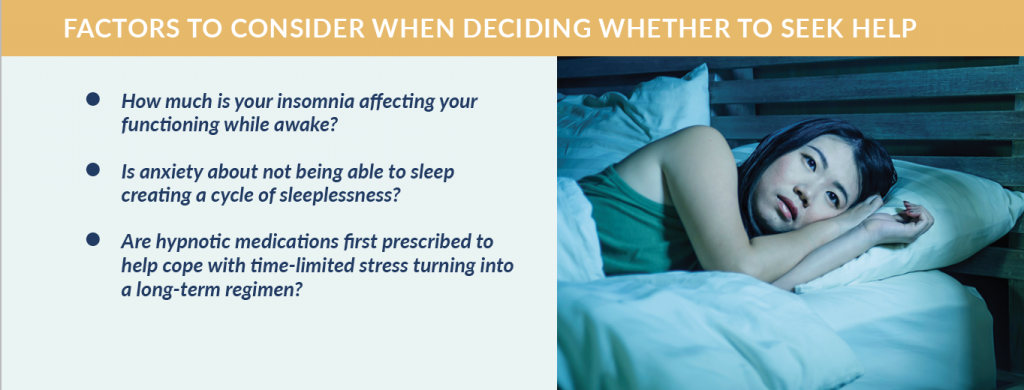
Paul Glovinsky, PhD has been working in the field of sleep medicine for more than 35 years. His study began in 1979 when he met Arthur Spielman, PhD, one of the founders of behavioral sleep medicine. Active on Dr. Glovinsky’s dissertation committee, their collaboration would continue until Dr. Spielman passed away five years ago. Together they wrote papers, chapters, and entire books focused on insomnia and its treatments. In 1985, Dr. Glovinsky became connected with Dr. Aaron Sher, and together they took on the role of Co-Directors of a sleep disorder center in Albany, NY until recently. Today, he maintains clinical practices in New York City and Albany.
When to Reach Out
Nearly everyone experiences bouts of insomnia now and then. But when are those episodes worthy of needing medical attention? According to Dr. Glovinsky, insomnia usually resolves on its own and rarely progresses to chronic insomnia. He explains that three months is usually the “cut-off” between determining acute and chronic cases of insomnia. However, he explains other factors one needs to consider when deciding whether to seek help.

Finding a Sleep Specialist
Dr. Glovinsky notes that there is a shortage of specialists trained in treating insomnia (when compared to other sleep disorders like sleep apnea). His first bit of advice is to talk to an accredited sleep disorder center which can help direct you to a specialist if they do not have one on staff. According to Dr. Glovinsky, “There has been a push to develop ‘pyramids of care’ with broadly available resources such as books and internet-based treatment programs at the base; intermediately-trained practitioners who added coursework on insomnia and other sleep disorders to their general medical, nursing or psychological training in the middle; and certified behavioral sleep medicine specialists at the top.” The Society of Behavioral Sleep Medicine also maintains an international listing of providers on its website (behavioralsleep.org).
Insomnia Treatment Overview

If you decide you need to seek treatment for your insomnia, your journey will probably look something similar to the outline below:
1. Filling out paperwork over a period of days/weeks and at home which may contain things like:
~ Questionnaires
~ Rating scales
~ Sleep logs/diaries
2. A consultation with a sleep specialist where you will share a detailed history of things like:
~ Are you sitting or lying down in the evening?
~ Is the overhead light on when you go to the bathroom in the middle of the night?
~ What time do you consume afternoon coffee?
~ What are your personal relationships like?
~ What are the stressors in your life?
~ How do your moods vary?
3. Out of this consultation will come a treatment plan. This will usually include things like:
~ A course of cognitive behavior therapy for insomnia (CBT-I)
~ Interventions aimed at circadian rhythms that can often underlie sleep
~ Short-term focus: 4-8 sessions that may initially be spaced fairly close (possibly 1-2 weeks apart in the beginning) and then increasing in length between appointments as time goes on
4. Overnight sleep studies are generally not needed but if necessary, usually occur later down the road
The most important point to understand is that insomnia is treatable. Sleep is a necessity for health and wellness. If you or someone you love are living with chronic insomnia, please reach out to a professional. Healthy sleep is achievable.
Wendi is a former high school English teacher and writer/editor for the RLS Foundation who is now homeschooling her four children on a farm in East Tennessee.



